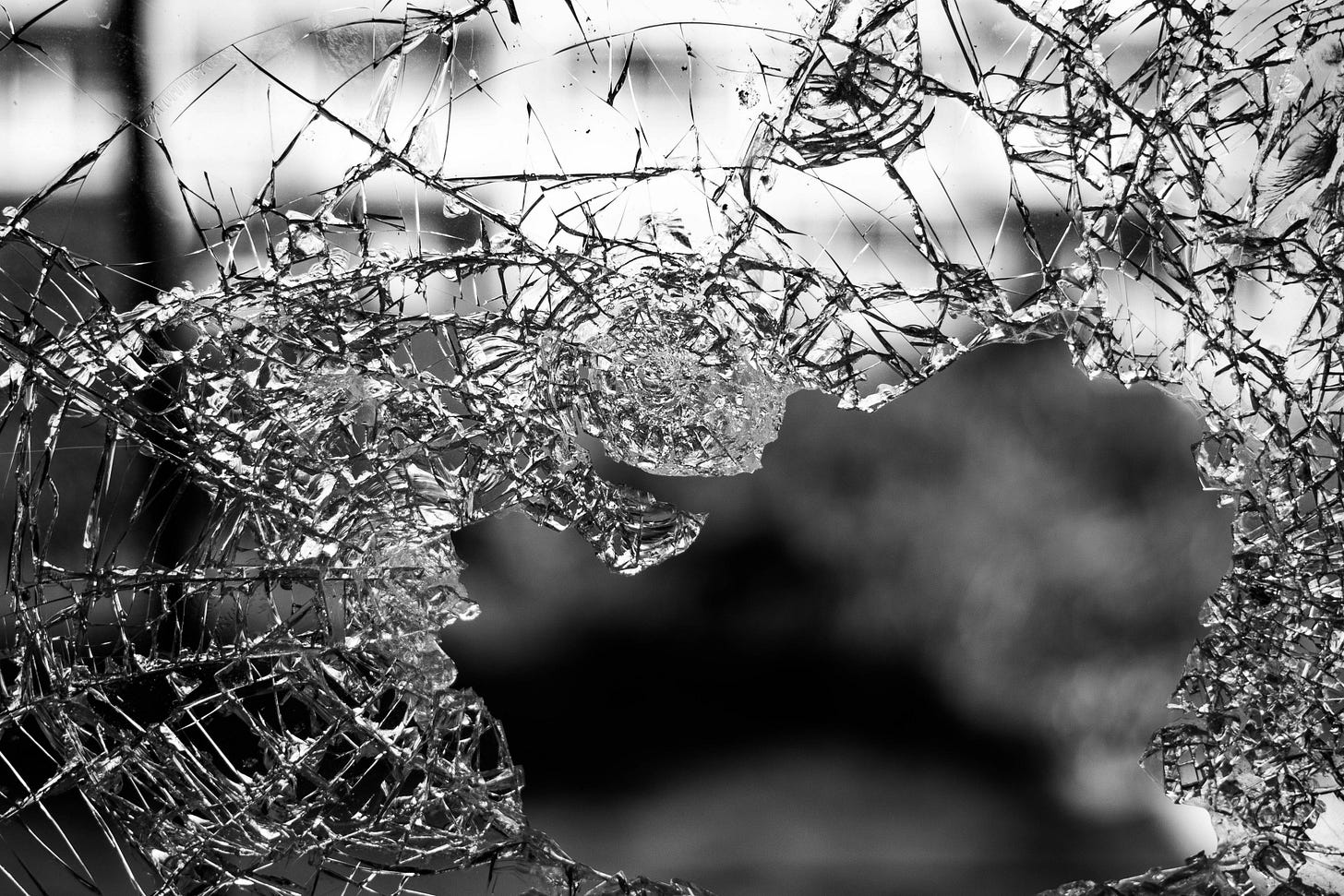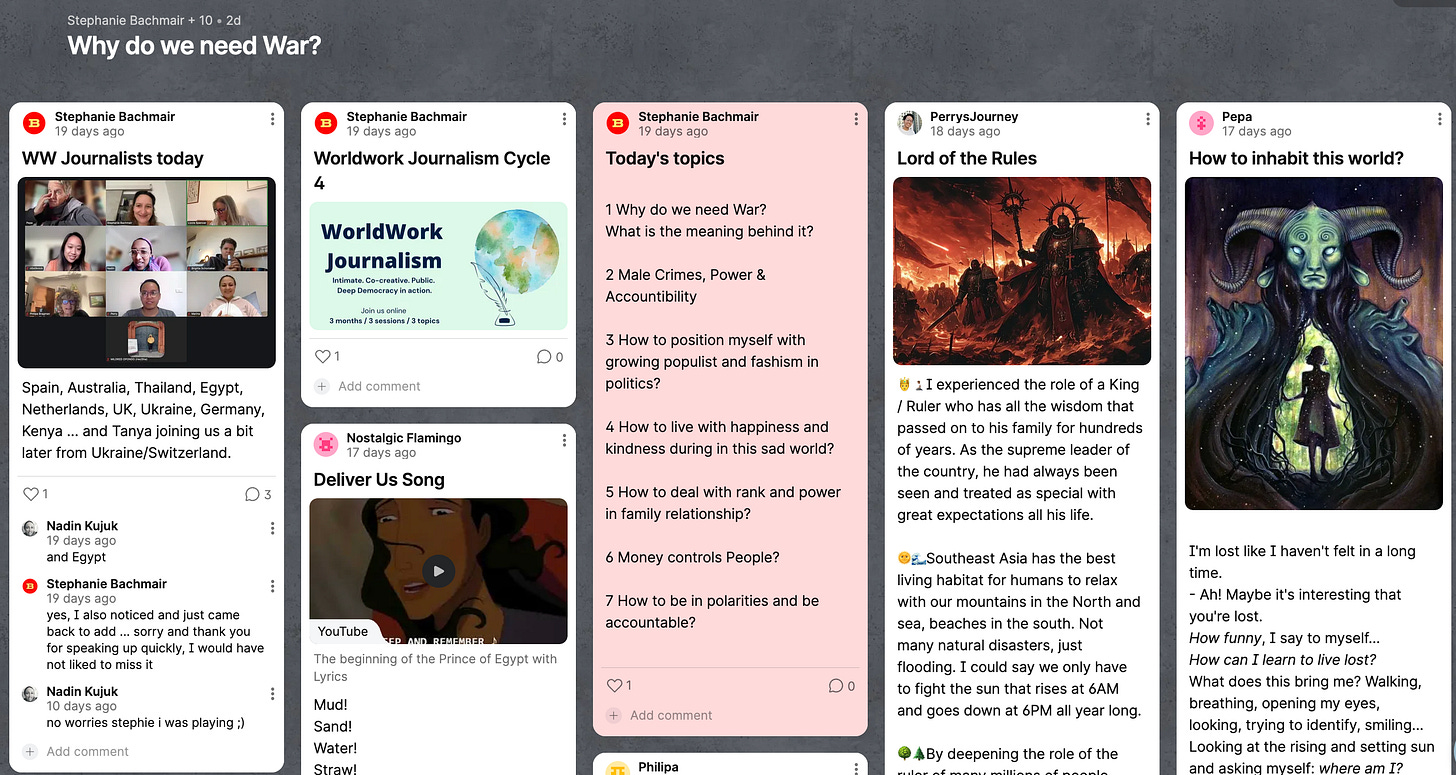foto from jilbert ebrahim on unsplash
In a recent global dialogue on “Why do we need wars?”, participants from across the world shared deep personal stories and reflections. Their contributions spanned centuries-old legacies, raw emotional struggles, and the challenging process of embracing uncertainty. The following sections weave together these narratives—each a testament to the complexity of power, loss, and the potential for transformation.
On Saturday the 18th of January 2025, we had another Worldwork Journalism session (3rd of cycle IV). This time we came together from Kenya, Ukraine, Germany, Spain, Egypt, Thailand, Switzerland, the Netherlands, Australia and the UK. As usual, the co-creative process started with an online Worldwork session (facilitated dialogue) for 30-40 minutes, before everybody captured their own experience in words, and deepened personal high- or downlights by writing and sharing some of the personal story it evoked.
Here are the shared reflections of the ‘world work journalists’ after the facilitated dialogue on ‘Why do we need wars?’.
As a reader, you are also invited to share your perspective on the topics or delve deeper into the aspects discussed by participants, in the comments below.
1. The Weight of Legacy and the Burden of Power
Exploring Ancient Roles in a Modern World
Perry from Thailand set the stage with a reflection on historical leadership:
“I experienced the role of a King / Ruler who has all the wisdom that passed on to his family for hundreds of years… By deepening the role of the ruler, I felt massive confidence, security and strength.”
He painted a picture of a land blessed by nature yet governed by age-old responsibilities.
2. The Inner Battle: Anger, Vulnerability, and the Desire for Reconciliation
Facing the Duality Within
Many participants conveyed the tumult of internal conflict. Philipa from the UK described an intense, almost visceral confrontation with her inner aggressor:
“At one point I felt so strongly in my whole body the need to annihilate the one with power. I wanted to blow the head off the one with power over me…”
Yet she also recognized a yearning for peace and understanding:
“…I have other parts in me that desperately want to find peaceful ways forward… acknowledging that furious, powerful part is essential.”
Similarly, Lizzie from Australia revealed her discomfort with inherited power structures:
“I still can’t bear that the ones who take power, money, sex, wars… say they are doing it to look after everyone. … My deep question was … how can I be in these extreme polarities and take action?”
And Marina from Ukraine offered a transformative insight into engaging with dominant power figures:
“I am not afraid of you anymore, I lost so much, I died so many deaths… I can meet you with my power … it is not about being only strong anymore, it is about being strong and being vulnerable.”
These voices echo the universal struggle of balancing the urge to fight with the need to heal.
3. The Impact of War: Grief, Loss, and Daily Realities
Bearing the Brunt of Conflict
For those directly affected by ongoing conflicts, the toll is both visible and deeply felt. Marina from Ukraine shared a poignant snapshot of loss:
“You don’t care how many children die… how many have already been buried. The only way to free myself is to face you!”
Tanya from Ukraine/Switzerland added her own heart-wrenching perspective:
“It causes numbness in my body and leaves me frozen, empty and hopeless. I feel lost.”
These accounts serve as a powerful reminder that war’s repercussions extend far beyond headlines—they are lived every day in moments of overwhelming grief and fatigue.
4. The Outsider’s Perspective and the Quest for Integration
Stepping Back, Then Moving Forward
Not everyone felt compelled to fully inhabit the roles of combatant or victim. Nooknick from Thailand expressed the desire to remain detached:
“I think we all wish we could be the ‘3rd parties’, the outsider of the wars.”
Meanwhile, Nadin from Egypt reflected on the duality of power through the lens of a warlord-turned-ruler:
“What stood out to me today was the experience playing the role of a warlord masquerading as a ruler. … It felt like an annihilation of the heart by the mind … maybe what will save our souls is integration.”
Her narrative invites us to consider how integrating logic with emotion, calculation with vulnerability, might be key to healing from the internal and external conflicts we face.
5. Embracing the Lost: A Journey Through Uncertainty and Vulnerability
Finding Meaning in Being Lost
Adding a resonant, reflective note to the dialogue, Pepa from Spain offered a candid exploration of what it means to feel lost:
*“I'm lost like I haven't felt in a long time.
Ah! Maybe it's interesting that you're lost.
How funny, I say to myself...
How can I learn to live lost?
What does this bring me? Walking, breathing, opening my eyes, looking, trying to identify, smiling... Looking at the rising and setting sun and asking myself: where am I?
As I write this now I wonder (or maybe I feel, because a little calm has settled in my heart) if this is the way of living that will bring me something...
Living in the midst of loss. The pain of people turning their heads the other way, of not wanting to look at my loss, makes me feel even more lost.
Staying “lost” and being able to see what this other way of living is.
A slight relief at seeing it recognized, that it is normal to “be lost” in the midst of this chaos.
The harshness of the warlords, a strong energy that impacts me. And while someone says they can't breathe.
The whole group process has a huge impact. How to inhabit this world?
And I can't find an answer, that's why I'm lost.”*
Pepa’s introspection challenges us to reframe loss—not as a failure, but as an invitation to explore new ways of being. Acknowledging our lostness might be the first step toward a more authentic, integrated way of inhabiting life in a world rife with conflicting forces.
Conclusion
This global dialogue on war has revealed that conflict is not just a matter of politics or power—it is also an internal struggle, a dance between history, identity, and vulnerability. Whether through the weight of legacy, the raw intensity of inner battles, or the candid admission of feeling lost, each story invites us to re-examine our assumptions about power and connection. By embracing the full spectrum of our experiences, we may yet find new paths to healing and transformation in a world desperate for change
Thank you to all Worldwork Journalists involved in this conversation and sharing their personal experience. And a special thanks to Perry for joining Cynthia and myself, Stephie B., in editing!
And you, dear reader, which voice speaks to you? What is this topic and what are our shared voices evoking in you? Is any insight coming up?
We are looking forward to engaging with you in the comment section!
Apart from commenting below, we invite you to read and join the conversation here on Substack regularly by subscribing. We are grateful for every comment, as it enriches our conversations and supports this tender plant's growth.
About 🌏 Worldwork
Worldwork is an application of Processwork also known as process-oriented psychology. As a psychological and conflict-resolution approach developed by Arnold Mindell in the 1970s, it's based on the principles of Jungian psychology, Taoism, and systems theory, and it is used in various settings, including therapy, organizational development, community building, and conflict resolution. At its core, Worldwork aims to explore and understand both individual and collective processes in order to address conflicts, promote personal growth, and create more harmonious relationships within groups and communities. It focuses on bringing awareness to marginalized or ignored perspectives, as well as the deeper layers of consciousness within individuals and groups.
Editors of this space
Cynthia Wanjihia is a passionate Process Work student as well as a Cyber Security student. She is open minded in world work as well as inter-generational relationships hoping to relate to all and create a safe space to feel heard and share their story.
Stephanie Bachmair (B.ONFIRE/DD Alliance) is a communication enthusiast, facilitator, leadership coach, and process work diplomat. She supports individuals, teams, and organizations to explore and craft their stories, tell them with charisma, relate to their audience, and increase their transformative power through dialogue.
If you want more
If you want to get inspired around leadership, deep democracy and/or transformational storytelling, and be informed about further happenings, you can also subscribe to our monthly B.ONFIRE newsletter
For professional updates on leadership, communication, and deep democracy facilitation check our website www.b-onfire.com, and other social media channels: https://linktr.ee/b_onfire
Thanks for reading Worldwork Journalism! Subscribe for free to receive new posts and support our work.





